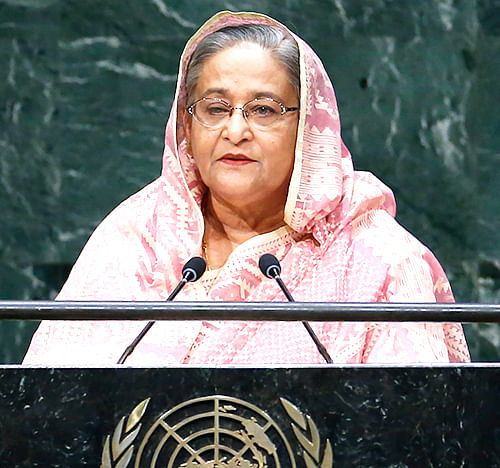Play central role for global peace
Play central role for global peace

Prime Minister Sheikh Hasina today urged the United Nations to play the central role as the custodian of global peace, security and development saying the evil forces destroying secular fabrics of the nations should be eliminated.
Expressing her grave concern over volatile global security situation and emergence of religious militancy and violent extremism, she said the volatile global security situation continues to pose significant challenge to international development.
Hasina said, "Threat to peace anywhere is a threat for entire humanity. We cannot achieve sustainable development in the absence of durable peace and security."
Addressing the 69th session of the United Nations General Assembly, the Prime Minister said Bangladesh strongly believes in the centrality and legitimacy of the UN as the custodian of global peace, security and development.
Hasina said terrorism and extremism remain major impediments to global peace and development. Bangladesh maintains a 'zero-tolerance' policy to all forms of terrorism, violent extremism, radicalisation and religion-based politics, she said.
"We remain firm in our resolve not to allow any terrorist individual or entity to use our territory against any state," she added.
Saying that anti-liberation forces continue to remain active in destroying the progressive and secular fabric of Bangladesh, Hasina said, evil forces resorted to religious militancy and violent extremism in every opportunity.
Hasina said her government remains pledge-bound to bring to justice the culprits of war crimes in 1971 to uphold peace and rule of law and end a culture of impunity.
The highly transparent, impartial and independent International Crimes Tribunals (ICT) of Bangladesh have already completed trials of a few key criminals who perpetrated heinous crimes against humanity during the Liberation War of the country in 1971.
"We look towards international community's full appreciation of the aspirations of our people for this long-awaited justice," she said.
Hasina said the Bangladesh government is entrenching democracy, secularism and women empowerment to ideologically defeat terrorism and extremism.
"We have also significantly enhanced transparency and accountability in governance by strengthening our election, anti-corruption, human rights and information commissions," she said.
She said Bangladesh's commitment to international peace has manifested through proposal of Bangladesh 'Culture of Peace and Non-violence" and later adopted by the 68th session of the UNGA.
"Our peace leadership is further reaffirmed through our support to the UN as a top troops and police contributing country in its peacekeeping missions," she said.
Bangladesh has so far contributed 128,133 peacekeepers in 54 UN peace missions. Bangladesh contributed the highest number of women police to UN peacekeeping commensurate with our women empowerment credentials, she said.
Focusing on the militants' extremism in the local politics, Hasina said, the militants and terrorists under the direct patronage of the BNP-Jamaat alliance government during their 2001-2006 regime, coalesced to form terrorist outfits.
Those militant groups perpetrated bomb and grenade attacks killing secular political leaders and activists, she said adding the gruesome attacks cemented my resolve to create a strong legal and regulatory regime for countering terrorism including adoption of amended Anti-Terrorism Act 2013 and Anti-Money Laundering Act 2012.
Prime Minister Sheikh Hasina said four decades back, Bangladesh's founding father Bangabandhu Sheikh Mujibur Rahman, in his maiden speech at the UNGA, espoused his vision for a global order.
In that speech Bangabandhu had said that Bengali nation is pledge-bound to establish a global order based on peaceful co-existence, social justice and freedom from poverty, hunger, exploitation and aggression.
"The great leader's vision continues to guide Bangladesh's national development pursuits and our engagement in the global affairs," the prime minister said.
Hasina said the 69th session of the UNGA is being held at a time when the global development discourse is at an important juncture, as the implementation of MDGs approaches its deadline and the global community is engaged in framing a transformative development agenda for 2016-2030.
Pointing out her government's people-centric vision to transform Bangladesh into a knowledge-based, technology-driven middle income country by 2021, the prime minister said Bangladesh government has integrated the Millennium Development Goals (MDGs) into the national five-year plans and 'Vision 2021' to achieve the goal.
She highlighted Bangladesh's success in attaining MDGs saying Bangladesh has already met or, is on track to meet MDG-1, 2, 3, 4, 5 and 6. Poverty has been reduced from 57% in 1991 to below 25%.
During the last five years, she said, average GDP growth remained 6.2% despite global recession, export earnings grown up more than 3 times from around US$10.53 billion in 2006 to over US$ 30.5 billion last fiscal.
Remittance flow also increased nearly three times from US$ 5 billion in 2006 to US$ 14.5 billion while foreign reserve jumped by 6.5-fold from US$ 3.49 billion in 2006 to US $ 22 billion at present, she said.
Hasina said Bangladesh has undertaken some massive infrastructure and connectivity projects in order to unlock development potentials. The projects include a 6.15km bridge over the mighty river Padma with own resources, development of a deep seaport in Sonadia, Chittagong. Upgrading the road and rail infrastructures, including expressways and river tunnels, is underway, she said.
In this regard, the premier mentioned agreements signed with friendly countries-India, China and Japan-to develop large scale power plants to meet the country’s growing demands by 2021.
She said eighteen Economic Zones (EZs) are being developed across the country to allow potential investors to invest in Bangladesh especially in the context of the country’s growing integration into the regional connectivity framework.